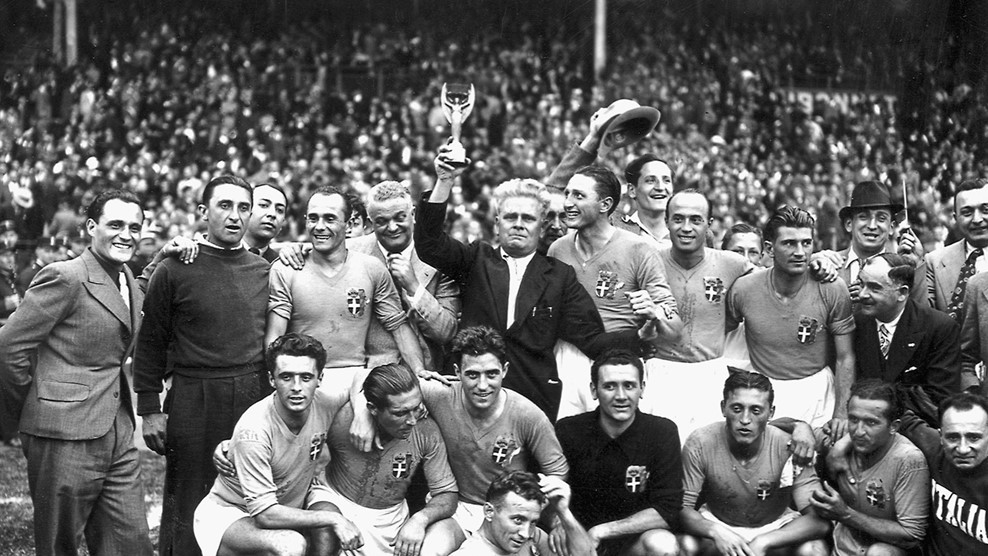Vittorio Pozzo cemented his legend as one of the greatest national team managers by guiding the Azzurri to a win over Hungary in 1938 final in Paris as Italy became the first country to repeat as champions. Let us have a look at what happened.
France 1938 was not just a World Cup marred by conflict on the political stage. It affected football as well. With the world on the brink of war, France hosted the 1938 World Cup marked by the absence of Austria, under German occupation, and Spain, preoccupied with civil war. England were in conflict with Fifa, and South America, peeved at not being chosen as host after Italy 1934, sent only one representative, Brazil. Uruguay and Argentina both refused to play. In total 16 teams were participating after a qualification that included 37 teams (the host nation France and the reigning champions Itaasly w directly qualified). The World Cup in 1938 would be dominated by European nations, 13 of 16 teams were European. The fact that two World Cups in a row were held in Europe was met with anger in South America that had expected the tournament to be played in their continent every second time. This led to a boycott. The most exotic team to participate was Dutch East Indies (Indonesia) that also became the first Asian team to participate in the World Cup. They had qualified since all other teams in Asia withdrew. It was also noticeable in the games that included Germany or Italy by an upset audience. The Italian players made fascist salutes before the games and when they had to change to the away team shirt against France in the Quarter-finals, they would not play in white shirts as usual but black – the fascist color.
The format for the competition was a knock-out tournament. If the match was a tie after regular match time a period of 30 minutes extra time would take place. If the match still wasn’t decided after extra time a rematch would be arranged the following day (penalty shoot-out was not introduced until 1978). The tournament will also be remembered forever for the ‘Rubber Man’ Leonidas, the Brazilian forward who scored seven goals, including three in a 6-5 win over Poland – till date one of the most exciting games in World Cup history. In one of the most interesting World Cup incidents, Italian legend (and captain) Giuseppe Meazza’s shorts fell down as he stepped up to take a spot kick against Brazil in the semi-final. The legend goes that Meazza picked up the shorts in one hand and coolly slotted the ball past the Brazilian goalkeeper who was unable to control his laughter.
On June 19 at the Colombes stadium in Paris, Italy took to the field with only Hungary standing in their way to repeating as world champions. When the Italians scored six minutes into the contest through Gino Colaussi, the rout appeared to be on. Pal Titkos leveled the score two minutes later, but the goal proved to be only a brief respite for the Hungarians. Giovanni Ferrari and Giuseppe Meazza, Italy’s dynamic inside-forward partnership, took hold of the game and set up Piola’s goal in the 15th minute. Ten minutes before half, Ferrari and Meazza worked their magic again, this time finding the unmarked Colaussi, who netted his second of the game. Hungary’s captain Gyorgy Sarosi scored in the 70th minute, but Italy put the game away with 10 minutes left in regulation when Amedeo Biavati back-heeled a pass to Piola, who beat goalkeeper Antal Szabo with a powerful left-footed shot: 4-2 to Italy.
This was the last major international sporting event before the Second World War. Europe’s map was about to change & the next two editions of the World Cup were scrapped for obvious reasons. The world’s most popular sporting spectacle wouldn’t take place against until 1950 in Brazil. Although controversial, it was still a world title for the Italians & they celebrated it as so.
![]()

